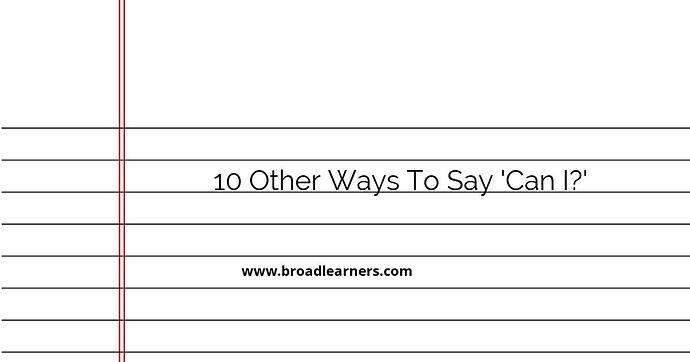When asking for permission or making a request, using the phrase 'Can I?' is common. However, it's always good to have alternatives to make your language more varied and polite. Here are 10 other ways to say 'Can I?':
- May I?
- Is it possible for me to?
- Would it be okay if I?
- Could I?
- Is there a chance I could?
- Would it be acceptable for me to?
- Do you mind if I?
- Is it alright if I?
- Would you mind if I?
- Could I possibly?
Let's explore each alternative in more detail:
1. May I?
'May I?' is a formal and polite way to ask for permission. It is commonly used in professional settings or when speaking to someone in a position of authority. For example:
May I use your restroom, please?
2. Is it possible for me to?
This alternative phrase acknowledges that there may be limitations or constraints. It is a respectful way to ask for permission while considering the other person's perspective. For example:
Is it possible for me to borrow your pen for a moment?
3. Would it be okay if I?
This question shows consideration for the other person's feelings. It implies that you understand they have the power to grant or deny your request. For example:
Would it be okay if I join you for lunch?
4. Could I?
'Could I?' is a polite way to ask for permission. It suggests a sense of possibility and flexibility. For example:
Could I have a moment of your time to discuss something?
5. Is there a chance I could?
This phrase acknowledges the possibility that the request may not be granted. It shows humility and respect for the other person's decision. For example:
Is there a chance I could leave work a little early today?
6. Would it be acceptable for me to?
This alternative emphasizes the importance of obtaining permission and seeks to ensure that your actions align with what is considered acceptable. For example:
Would it be acceptable for me to bring a guest to the event?
7. Do you mind if I?
This phrase seeks permission while also acknowledging the possibility of inconvenience. It shows respect for the other person's preferences. For example:
Do you mind if I open the window? It's a bit warm in here.
8. Is it alright if I?
This question seeks permission while also expressing a desire to ensure that your actions are acceptable to the other person. For example:
Is it alright if I use your phone for a quick call?
9. Would you mind if I?
This phrase seeks permission while also showing consideration for the other person's preferences or comfort. For example:
Would you mind if I turned down the volume on the TV? It's a bit loud.
10. Could I possibly?
This phrase expresses a sense of uncertainty and politeness. It suggests that you are aware that the request may not be easily granted. For example:
Could I possibly have an extension on the deadline? I'm having some difficulties completing the task.
By using these alternative phrases, you can make your requests more varied and polite. Remember to consider the context and the relationship you have with the person you are asking for permission from. Being polite and respectful in your language can go a long way in creating positive interactions.
Did I miss anything? Respond below
